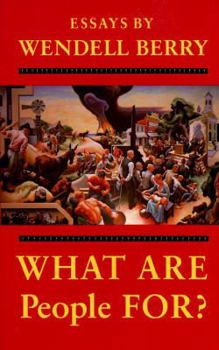What Are People For?: Essays
Select Format
Select Condition 
Book Overview
In the twenty-two essays collected here, Wendell Berry, whomThe Christian Science Monitorcalled "theprophetic American voice of our day," conveys a deep concern for the American economic system and the gluttonous American consumer. Berry talks to the reader as one would talk to a next-door neighbor: never preachy, he comes across as someone offering sound advice. He speaks with sadness of the greedy consumption of this country's natural resources and the grim consequences Americans must face if current economic practices do not change drastically. In the end, these essays offer rays of hope in an otherwise bleak forecast of America's future. Berry's program presents convincing steps for America's agricultural and cultural survival.
Format:Paperback
Language:English
ISBN:0865474370
ISBN13:9780865474376
Release Date:April 1990
Publisher:North Point Press
Length:210 Pages
Weight:0.50 lbs.
Dimensions:0.6" x 5.0" x 8.0"
Customer Reviews
5 ratings
"This successful life we're livin' got us feuding ..."
Published by Thriftbooks.com User , 15 years ago
This book inspired me to believe individuals and community can mutually enhance each other, and that God intended for us to enjoy our time on Earth much more than we generally do. It's full of inspiring quotes, e.g. "The more coherent one becomes within oneself as a creature, the more fully one enters into the communion of all creatures." The author is a philosopher, and his unique voice of exhortation is not overly preachy. Mr. Berry touches on many far-ranging topics of quotidian life: the real values of education; the merits of decentralized control; the inherent biases toward, and the effects of, centralized control; the idea that language and writing should involve all senses; the concept that the future is faith based on all that we do now. The author delves into the most fundamental human motivations, and why we should be stewards of the Earth. This book was a joy to read, and in these times of economic crisis it left me inspired that we can adapt and improve, and I feel sustained warm thoughts for the author. It was the first work of his I've read, and I'm eager to read more of his nonfiction and novels.
Worthy Read
Published by Thriftbooks.com User , 17 years ago
With sharp insight Berry's essays serve as a vision of a different life with different values: values of family, land, preservation, and thrift. Worth the time to read though Berry's vocabulary may be a hindrance to some less accomplished readers.
Should Be Read By All
Published by Thriftbooks.com User , 21 years ago
This book sits on my coffee table in the living room. I draw from Mr. Berry's philosophy and writings almost daily. This book should be required reading in colleges and universities. It speaks of the sensibilities most of us have forgotten. I have loaned my copy to many friends, all have read it, it has changed the way they approach their lives and how they look at how we all live.
If Only More People Listened
Published by Thriftbooks.com User , 22 years ago
I do not agree with everything Berry says in this book, but I must confess that he changed the way I see the world. His lucid dissections of American culture and economical practices, his bottom-up solutions to the problems facing us today, and his unselfish, honest prose convinced me of most of his points. Here is a writer not in it for fame or awards or prestige. Here we have a truly passionate, motivated, moral voice for these hollow times.
A gentle voice for common sense
Published by Thriftbooks.com User , 23 years ago
Berry hits another homerun in this collection. This Jeffersonian throwback offers us a vision of life far removed from the shopping mall mania that is stripping much of our countryside of its natural beauty. Berry, instead, suggests that a return to basics is the best way to ensure our independence, freedom and quality of life. Berry argues, as did T.S. Eliot, that a wrong attitude toward nature suggests a wrong attitude toward God. He introduces us to men whose greatness lies in being themselves -- a black farmer named Nate Shaw, a Kentucky environmentalist named Harry Caudill, and writer Edward Abby. He explores Huck Finn and A River Runs Through It, he suggests that an education that does not prepare us to take care of ourselves cannot be complete and argues that our educational system prepares us mainly to function as cogs in an industrial society. In short, Berry sustains his claim, made in most of his books, that we need to slow down our lives, rebuild human connections, value the land around us for its intrinsic worth, and cultivate our souls by cultivating our garden, if you will. As a previous reviewer points out, Berry does not fit easily into any political movement of today -- that is because there is no Jeffersonian movement to speak of, the democrats having abandoned local empowerment, the conservatives, too many of them, having embraced corporate power. Berry's is a voice that needs to be heard.






